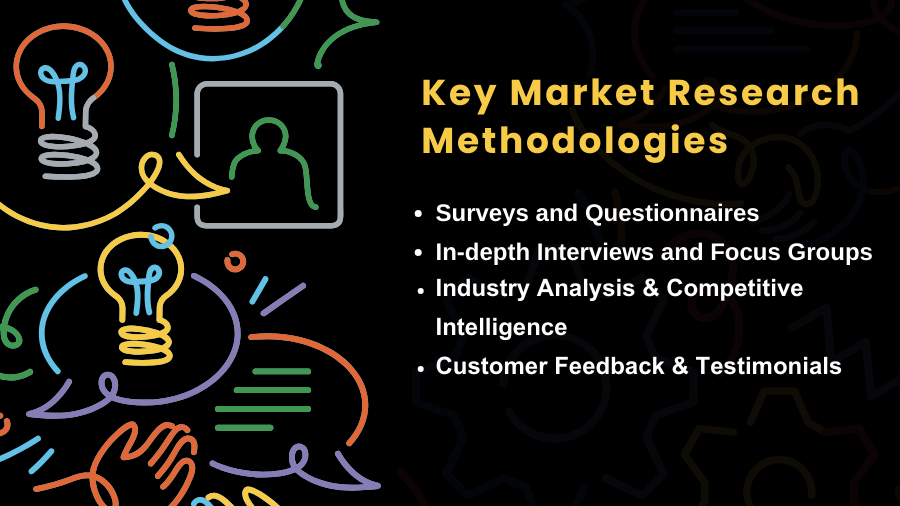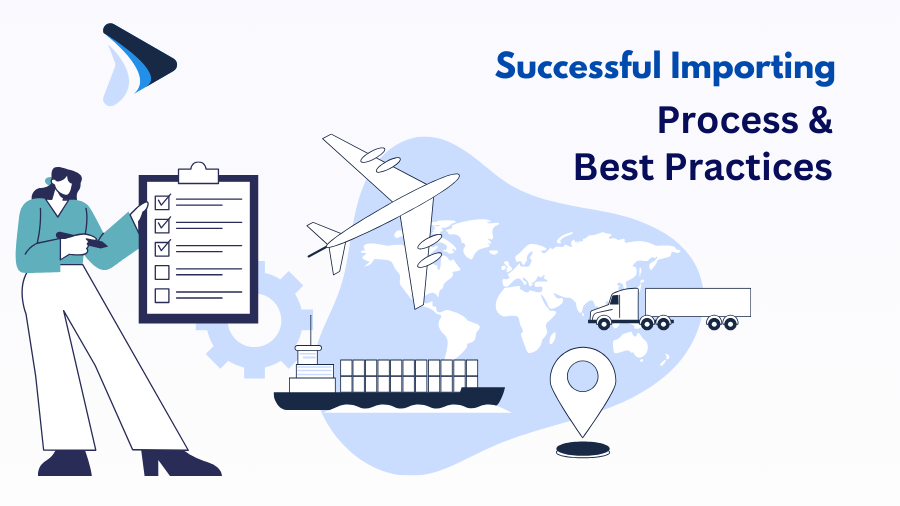
B2B market research, or business-to-business market research, is the systematic process of gathering and analyzing data regarding potential customers, market trends, competitors, and the industry as a whole. It's a fundamental practice that provides invaluable insights to drive informed business decisions.
The importance of B2B market research cannot be overstated. It enables businesses to understand the intricate dynamics of their market, identify opportunities, and formulate strategies that align with customer needs. Ultimately, this understanding leads to sustainable growth and a competitive edge in the market.
In this article, we aim to analyze B2B market research, section by section, bringing you closer to the strategies and insights that can drive your business forward. We'll explore the various types of B2B marketing research methods, uncover the techniques to effectively research a B2B audience, and discuss why conducting B2B market research is necessary. Additionally, we'll showcase real-world examples, provide you with key resources, and equip you with the knowledge to make well-informed decisions for your business. Let's enter on this enlightening journey into the world of B2B market research.
Understanding B2B Market Research
B2B market research, focusing on business-to-business interactions, is a strategic imperative for enterprises seeking sustainable growth. This systematic gathering of data and insights about potential partners, customers, and competitors enables businesses to make informed decisions, understand customer needs, craft targeted strategies, and optimize operations.
A. Definition and Concept of B2B Market Research
B2B, or Business-to-Business, signifies transactions and interactions between businesses rather than between businesses and individual consumers. Market research in this context involves a systematic gathering of data, insights, and information about other businesses that may be potential customers, partners, or competitors. It's about understanding their needs, preferences, and pain points to tailor your business strategies effectively.
At its core, B2B market research is like detective work for businesses. It's about investigating the market landscape, understanding the intricacies of your business peers, and uncovering the secrets to success in the competitive world of business interactions.
B. Why B2B Market Research is Crucial for Businesses
B2B market research is the strategic weapon that separates the winners from the losers. It's not just about data; it's about gaining actionable insights that empower you to outmaneuver your competitors, optimize your resources, and drive sustainable growth. Here's why B2B market research is crucial for businesses:
1. Informed Decision-Making:
In a volatile market, intuition can be a dangerous guide. B2B market research provides the data-driven insights you need to make informed decisions about product development, marketing strategies, pricing, and resource allocation. Move beyond guesswork and embrace the power of data-driven certainty.
2. Uncover the Hidden Desires of Your Customers:
In the B2B world, success is built on strong customer relationships. B2B market research helps you unravel the needs, preferences, and pain points of your target audience. By understanding their unique challenges and aspirations, you can develop products and services that address their needs and foster long-lasting partnerships.
3. Craft Strategies that Hit the Mark:
B2B market research isn't just about understanding your customers; it's also about deciphering the dynamics of your competitive landscape. By analyzing your competitors' strengths, weaknesses, and market positioning, you can identify opportunities for differentiation and develop targeted strategies that resonate with your audience.
4. Anticipate and Mitigate Risks:
The B2B landscape is fraught with unforeseen challenges. B2B market research helps you identify potential risks and threats before they impact your business. By understanding market trends, regulatory changes, and technological advancements, you can proactively develop contingency plans and minimize the impact of unforeseen circumstances.
5. Optimize Your Business Operations:
B2B market research isn't just about sales and marketing; it's also about optimizing your internal operations for maximum efficiency. By analyzing your current processes and resources, you can identify areas for improvement and implement data-driven solutions that reduce costs, increase productivity, and drive profitability.
Investing in B2B market research isn't an expense; it's an investment in your future success. It's the key to unlocking the hidden potential of your business and achieving sustainable growth in the dynamic world of B2B. Embrace the power of knowledge, and watch your business reach new heights.
C. Key Objectives and Goals of B2B Market Research
B2B market research isn't a haphazard data collection exercise; it's a strategic roadmap guiding your business toward sustainable growth and profitability. Each objective serves as a crucial milestone, illuminating the path to success:
1. Market Assessment:
Market Size and Growth Potential: Quantify the market size and understand its potential for growth. This helps you identify lucrative opportunities and prioritize your market expansion efforts.
- Emerging Trends and Opportunities: Identify the latest trends and emerging technologies shaping your industry. By anticipating these trends, you can adapt your business strategies and remain ahead of the curve.
- Barriers to Entry and Market Dynamics: Understand the regulatory landscape, economic factors, and any potential barriers to entry. This knowledge empowers you to mitigate risks and navigate the market with confidence.
2. Competitor Analysis:
- Strengths and Weaknesses: Analyze your competitors' strengths and weaknesses to identify areas where you can differentiate yourself and gain a competitive advantage.
- Strategies and Market Positioning: Understand your competitors' market positioning, pricing strategies, and marketing campaigns. This knowledge helps you develop targeted strategies that resonate with your audience.
- Gaps in the Market: Identify any unmet needs or gaps in the market that your competitors haven't addressed. This creates a unique opportunity for your business to develop innovative solutions and capture market share.
B2BMAP's Simple Competitor Analysis Worksheet
Unlock Business Insights with Our User-Friendly Competitor Analysis Worksheet!
3. Customer Profiling:
- Needs and Pain Points: Uncover the deepest needs and pain points of your target customers. This allows you to develop solutions that address their specific challenges and deliver tangible value.
- Decision-Making Process: Understand your customers' buying journey, including their research habits, preferred communication channels, and purchase triggers. This knowledge allows you to tailor your marketing and sales strategies accordingly.
- Customer Segmentation: Identify different segments within your target audience based on their needs, preferences, and buying behavior. This allows you to personalize your offerings and create targeted campaigns that resonate with each segment.
4. Product Development Optimization:
- Product-Market Fit: Evaluate the existing products and services against the needs of your target market. This helps you identify areas for improvement and ensure your offerings provide genuine value to your customers.
- Pricing Strategy: Determine the optimal pricing strategy for your products and services based on market demand, competitor analysis, and customer value perception.
- Product Differentiation: Identify unique features and benefits that differentiate your offerings from your competitors. This allows you to capture customer attention and build brand loyalty.
Types of B2B Market Research
In B2B market research, diverse methodologies are essential. This overview highlights key types - surveys for data, interviews for insights, industry analysis for strategy, and customer feedback for authenticity.

Exploring Different Types of B2B Market Research Methodologies
When it comes to B2B market research, having a versatile toolkit of research methodologies is crucial. Let's explore the primary methodologies:
1. Surveys and Questionnaires:
- Description: Surveys and questionnaires involve structured sets of questions presented to a specific group of B2B respondents to collect data and opinions.
- Purpose: To gather quantitative data efficiently and measure customer satisfaction, preferences, and market trends.
- Advantage: Large data sets can be collected and analyzed swiftly, providing statistical insights.
- Limitation: Responses may be superficial or biased due to limited options or leading questions.
2. Interviews and Focus Groups:
- Description: In-depth interviews and focus groups involve open-ended discussions with targeted B2B respondents to understand their perspectives.
- Purpose: To gain qualitative insights, explore complex issues, and uncover underlying motivations or concerns.
- Advantage: Allows for a deeper understanding of opinions, attitudes, and experiences.
- Limitation: Time-consuming and resource-intensive, limiting the number of participants.
3. Industry Analysis and Competitive Intelligence:
- Description: Industry analysis involves researching the market, trends, and competitors to understand the market landscape and opportunities.
- Purpose: To identify market trends, assess competitors, and understand the market's overall health and potential for growth.
- Advantage: Provides a broader view of the market and helps in strategic planning.
- Limitation: Relies on publicly available information, which may not always be comprehensive or up to date.
4. Customer Feedback and Testimonials:
- Description: Gathering feedback and testimonials directly from customers who have used your products or services.
- Purpose: To showcase real experiences, build trust, and gather constructive feedback for product/service improvements.
- Advantage: Provides authentic insights and builds credibility.
- Limitation: Relies on voluntary responses, which may not always represent the entire customer base.
Each research methodology has its unique strengths and weaknesses, and choosing the right mix depends on the research objectives, budget, and timeline. A judicious blend of these methodologies can yield a comprehensive understanding of the B2B market.
Conducting B2B Market Research - Steps and Best Practices
Navigating the world of B2B market research requires a strategic approach. Let's break down the process into actionable steps:
1. Defining Research Goals and Objectives:
- Understand the Why: Clarify the purpose behind the research. Are you seeking to improve a product, enter a new market, or refine your marketing strategy?
- Set Measurable Goals: Define specific, measurable, achievable, relevant, and time-bound (SMART) goals to guide your research efforts.
2. Identifying the Target Audience and Market Segments:
- Customer Personas: Create detailed personas representing your ideal B2B customers. Consider demographics, industry, pain points, and preferences.
- Market Segmentation: Divide the market into segments based on characteristics such as industry, company size, geographic location, or behavior.
3. Collecting and Analyzing Relevant Data:
- Survey and Questionnaire Design: Develop targeted surveys or questionnaires aligned with your goals and aimed at gathering insights from your identified audience.
- Leverage Existing Data: Utilize internal data, industry reports, and secondary sources to enrich your understanding of the market.
4. Interpreting Research Findings:
- Data Analysis: Use statistical analysis tools to process the collected data and derive actionable insights.
- Connect the Dots: Relate the data to your research objectives, drawing conclusions and actionable recommendations based on the findings.
Best Practices for Effective B2B Market Research
- Stay Agile: Adaptability is key. The B2B landscape is constantly changing, and research strategies need to evolve accordingly.
- Utilize Technology Wisely: Leverage advanced tools for data collection, analysis, and visualization to enhance efficiency and accuracy.
- Engage with Stakeholders: Involve key stakeholders in the research process to ensure their perspectives are considered and aligned with organizational goals.
- Maintain Objectivity: Avoid biases in survey design, data interpretation, and analysis to ensure the research findings accurately reflect the market realities.
- Regularly Review and Update Strategies: B2B markets are dynamic. Periodically review and update your research methodologies to stay relevant and effective.
- Collaborate with Experts: Consider collaborating with experienced professionals or research agencies specializing in B2B markets to benefit from their expertise and insights.
Importance of B2B Market Research
In B2B, making decisions in the dark can be risky. B2B market research is like a bright light, showing the way for decision-makers. It's about understanding what customers want and predicting market trends, helping businesses stay ahead in the competition. Plus, it's a tool for smart investing, making sure businesses don't take unnecessary risks in the unpredictable business sea.
In the bustling world of B2B trade, where businesses engage in deals and transactions, the spotlight is on market research – not just an option but a must-have. Let’s see why it's so crucial.
A. Enhancing Decision-making and Strategy Development
In the dynamic B2B ecosystem, decisions made in the dark can be detrimental. B2B market research illuminates the path, providing a well-lit roadmap for decision-makers. By exploring comprehensive market insights, decision-makers can chart out strategies with precision. It's like to having a crystal ball that foretells market trends and customer behaviors, empowering businesses to tailor their strategies to meet the evolving needs of their audience.
The analytical gaze of market research doesn't just stop at understanding the market landscape. It digs deeper, unraveling the intricate threads of consumer preferences, competitor moves, and industry shifts. Armed with this knowledge, strategies can be finely tuned, marketing campaigns can be optimized, and product portfolios can be refined. Ultimately, it's about making informed decisions that position your business ahead in the competitive race.
B. Mitigating Risks and Making Informed Investments
In the business world, risks are ever-present. However, B2B market research is similar to a risk-management tool, helping businesses navigate turbulent waters with caution and foresight.
Market research lays bare the risks, enabling businesses to anticipate challenges and devise risk mitigation strategies. Investing resources without understanding the market is like blindly throwing darts in the dark. B2B market research ensures your investments are informed and strategic.
C. Improving Customer Satisfaction and Loyalty
Customer satisfaction guiding businesses towards success. In the space of B2B interactions, understanding customer needs and preferences is essential. B2B market research peels back the layers to reveal what makes your customers tick. It's about understanding their pain points, desires, and expectations.
By aligning your offerings with what your customers truly need, you enhance customer satisfaction. Satisfied customers become loyal patrons, advocating for your brand and paving the way for sustained growth. Customer loyalty is a prized possession in the business world, and market research helps in nurturing it by aligning your business strategy with what matters most to your clients.
Boost Your Business Visibility with B2BMAP
Give Your Business The Visibility it deserves today. Unleash Success Today!
Resources and Tools for B2B Market Research
Successful B2B market research demands a strategic selection of tools and resources. Key resources like Statista and Forrester Research, coupled with the invaluable insights from B2B market research reports, serve as essential guides.
A. Recommended Companies and Platforms for B2B Market Research
- Statista: Statista is a comprehensive platform offering statistical data and insights across various industries. It's a treasure trove for data-driven B2B market research.
- Forrester Research: Forrester provides in-depth research and analysis on technology and market trends, offering valuable insights for B2B businesses.
- IBISWorld: IBISWorld offers industry reports and analysis, helping businesses understand various industries and make informed decisions.
- LinkedIn: LinkedIn is a powerful platform for B2B market research, providing access to industry professionals, groups, and valuable insights through articles and posts.
- Gartner: Gartner provides research and advisory services, particularly in the technology sector, aiding businesses in making informed technology-related decisions.
B. Overview of B2B Market Research Reports and Their Value
B2B market research reports are like treasure maps in the vast ocean of business. They offer a wealth of insights and intelligence, saving businesses valuable time and effort. Here's a glimpse of their value:
- Market Trends and Dynamics: These reports provide an overview of current trends, emerging technologies, and market dynamics, allowing businesses to stay ahead of the curve and align their strategies accordingly.
- Competitive Landscape: Detailed analysis of key players, their strategies, strengths, and weaknesses give businesses a competitive edge by helping them understand where they stand and how to position themselves effectively.
- Customer Insights: Market research reports often include customer behavior and preference data, offering a glimpse into what customers are seeking. This aids in tailoring products and services to meet those needs.
- Risk Assessment and Mitigation: Understanding potential risks in a market is critical. B2B market research reports help identify these risks and devise strategies to mitigate them effectively, minimizing negative impacts on businesses.
- Investment and Expansion Opportunities: Reports highlight potential areas for investment or expansion. By leveraging this information, businesses can make well-informed investment decisions, ensuring growth and profitability.
B2B Market Research - Expert Tips and Key Insights
B2B market research isn't just about data collection; it's about unlocking the potential of your business. Here are expert tips and key insights to help you harness the true power of B2B market research:
- Start with Clear Objectives: Define your research goals precisely. Know what you want to achieve, whether it's understanding customer needs, analyzing the competition, or identifying market trends.
- Quality Over Quantity in Data Collection: Focus on gathering quality data that aligns with your research objectives. A smaller dataset of relevant, accurate information is far more valuable than a large dataset filled with noise.
- Understand Your Audience Intimately: Know your target audience inside-out. Dive into their pain points, aspirations, and motivations. The more you understand them, the better you can tailor your strategies.
- Leverage Technology for Efficiency: Utilize advanced tools and software for data collection, analysis, and visualization. Technology streamlines the research process and allows for more accurate insights.
- Combine Quantitative and Qualitative Approaches: Integrate both quantitative (numbers-driven) and qualitative (insight-driven) research methods for a comprehensive understanding. Numbers provide the 'what', while insights give you the 'why'.
- Stay Adaptable and Agile: Markets evolve rapidly. Be ready to adapt your research strategies and objectives to stay relevant and ahead of the curve.
- Collaborate and Seek External Perspectives: Don't hesitate to collaborate with industry experts, consultants, or research agencies. External perspectives often bring fresh insights and innovative approaches to your research.
- Invest in Continuous Research: B2B market research is not a one-time effort. Allocate resources for ongoing research to stay updated with market dynamics, evolving customer needs, and emerging trends.
- Validate and Cross-Verify Data: Always validate the accuracy and reliability of the collected data. Cross-verify findings using different methodologies for a more robust analysis.
- Transform Insights into Actionable Strategies: Research is only valuable if it leads to action. Translate your insights into strategies, product improvements, targeted marketing campaigns, and refined business decisions.
- Measure and Optimize: After implementing strategies based on research, measure their impact. Learn from both successes and failures to continuously optimize your approach.
Conclusion
In a world driven by data and informed decisions, B2B market research emerges as the catalyst for strategic growth and profitability. Through this journey, we've uncovered the essence of B2B market research, showcasing its significance, methodologies, and the tools that power it.
B2B market research empowers businesses with vital customer insights, risk mitigation strategies, and the agility to adapt to changing markets. By investing in understanding customer needs, companies can achieve revenue growth that is 2.3 times greater than competitors (The Boston Consulting Group).
In this data-driven era, B2B market research isn't optional; it's the compass guiding businesses through uncharted waters. So, let's embrace it, apply it, and watch it transform our strategies, maximize profits, and lead us to enduring success.
Frequently Ask
B2B market research is a systematic process of gathering and analyzing data about potential customers, market trends, competitors, and the industry. It helps businesses make informed decisions to drive growth.
B2B market research is crucial for understanding market dynamics, identifying opportunities, and aligning strategies with customer needs. It provides valuable insights for sustainable growth and a competitive edge.
There are various types, including product research, competitor analysis, customer satisfaction surveys, and industry trend analysis. Each type serves a specific purpose in understanding different aspects of the market.
Start by defining your research objectives, identify your target audience, choose appropriate research methods, gather data, and analyze the findings. Follow best practices and leverage available tools for a comprehensive approach.
B2B market research is beneficial for businesses of all sizes. Small businesses can use it to understand their niche, identify growth opportunities, and make resource-efficient decisions. Tailor your approach to the scale of your business for maximum impact.
B2B market research provides actionable insights that help businesses make informed decisions. This, in turn, leads to improved product development, targeted marketing strategies, and a better understanding of customer needs, ultimately contributing to overall success.
Challenges may include data accuracy issues, evolving market dynamics, and changing customer behaviors. Overcome them by staying adaptable, utilizing a mix of research methods, and continuously validating and updating your research strategies to align with market shifts.
Grow Your Business Online
Use Our Buyer Seller B2B Marketplace to Source Your Product or Increase Sells & Revenue by Getting New Buyers.


